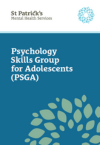Psychology Skills Group for Adolescents (PSGA) is a psychological group therapy for young people aged 13 to 18 who are experiencing a range of mental health difficulties.
PSGA aims to support young people to learn new ways of coping that can help them to manage distress and difficulties with emotions, and to navigate their relationships more effectively.
Emotional dysregulation describes having difficulties in regulating, or managing, feelings and emotions. Some people manage their emotions in overcontrolling or under-controlling styles. People who have an under-controlled emotional regulation style might struggle to manage their emotions, experience intense relationships, or have a history of deliberate self-harm, suicidal ideation, and suicidal behaviours. People with an overcontrolled emotional regulation style might inhibit (or hold back) how they express their emotions, show little change in their emotions, avoid risk, or appear distant and aloof in relationships.
The PSGA programme aims to support young people to better regulate their emotions. It may be suitable for young people who are experiencing a range of mental health difficulties, such as emotional dysregulation, low mood, anxiety, or eating disorders, and/or who have an overcontrolled or under-controlled emotional regulation style.
Parents or caregivers are also invited to attend some parts of the programme. The programme is therefore also for parents or caregivers who are willing to support their young person with new skills and practise new skills themselves.
Group format
This group involves learning a mixture of skills from Dialectal Behavioural Therapy for Adolescents (DBT-A), Group Radical Openness (GRO) and Radically Open Dialectical Behaviour Therapy (RO-DBT).
DBT-A aims to help people who struggle to manage their emotions. People who benefit from Dialectical Behaviour Therapy (DBT) skills may experience emotions at a higher level of intensity than others. GRO is a structured group therapy that was developed by psychologists here in St Patrick’s Mental Health Services (SPMHS) and helps people who struggle with difficulties associated with costly and harmful overcontrol. These can include difficulties with developing connections, needing control, and suppressing emotions. RO-DBT also aims to help people who experience problems with overcontrol. PSGA combines skills and exercises from all three models and takes place in a group-only format.
PGSA is delivered online on Monday afternoons and early evenings. It is run by two psychologists and an assistant psychologist. There are five modules to the programme which are delivered over 22 sessions. The modules address difficulties including confusion about yourself, emotional dysregulation, impulsivity, interpersonal difficulties, and family challenges.
We invite parents or caregivers to join young people for part of 18 group sessions to help support them in learning and practising new coping skills. Parents or caregivers are also supported in further developing their understanding of the young person’s experience.
Referrals
Referrals to PGSA are accepted directly from GPs: we have information for GPs on our referral pathways here, and GPs can specify the PGSA programme on the referral form they use. Following referral, a psychologist from the PSGA programme will meet with the person referred to assess whether the programme is suitable for them and to answer questions they may have. Please note that the GP retains clinical responsibility for service users accepted to the PGSA programme.
If the young person is a service user in SPMHS, referrals can also be made by their consultant or team psychologist. Any young person or parent who would like to attend PGSA can discuss it with their SPMHS clinician, who will refer them to the psychologist on the team to assess whether the group is a good fit for their needs.
Get the programme brochure








